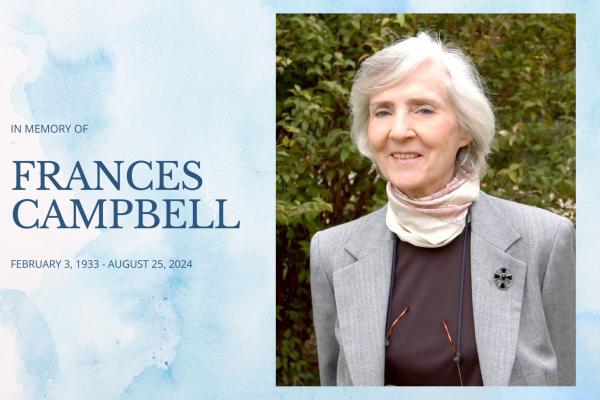
Remembering Frances Campbell
Frances Campbell, PhD, a former longtime senior scientist at the UNC Frank Porter Graham Child Development Institute (FPG) and an internationally recognized expert on the transformative impact of early childhood education, died August 25, 2024, at 91.
Campbell began her career as a clinical psychologist and came to FPG to help lead and evaluate the Abecedarian Project, one of the oldest and most oft-cited early childhood education programs in the world. Campbell, who remained at FPG until her retirement at 88, was an essential part of FPG’s history and growth, and her body of work is an enduring example of the influence FPG has on the lives of children and families in North Carolina and beyond.
For the Abecedarian Project, Campbell and a group of investigators began a randomized trial with around 100 children from low-income families born between 1972 and 1977. For the project, which would shape how others understood the importance of positive early childhood experiences, one group of children was exposed to a high-quality childcare setting five days a week for five years, from birth to school age. The control group received material support, such as formula and diapers, but not the childcare.
The Abecedarian Project followed the participants throughout their lives, assessing them at age 5, 8, 12, 15, 21, and 30, as well as in their mid-30s, recording at each interval findings that continue today to demonstrate that important, long-lasting benefits are associated with the high-quality early childhood program. Recipients of the early education curriculum were more likely to attend a four-year college or university and more likely either to be in school or to have a skilled job, and they were less likely to be teen parents or to report depressive symptoms, when compared to individuals in the control group.
Donna Bryant, PhD, a senior research scientist at FPG, knew Campbell for 45 years. Bryant came to FPG to work on the Abecedarian Project in its fourth year. Together, Bryant and Campbell also conducted a five-year study of Head Start Transition to School practices.
“It was clear right away that she knew all the ins and outs of conducting research with children and families and the practices one was expected to follow at FPG,” said Bryant. “She was a wonderful colleague and also became a good friend. Hers was a life well-lived.”
“It was clear right away that she knew all the ins and outs of conducting research with children and families and the practices one was expected to follow at FPG,” said Bryant. “She was a wonderful colleague and also became a good friend. Hers was a life well-lived.”
The impact of Campbell’s work was significant for FPG and for the study of child development, and she continued to evaluate Abecedarian Project findings and publish new developments over the next four decades. In 2014, Campbell and others published findings in Science showing that participants in the early educational intervention group had better physical health in their 30s than their peers who did not attend the program.
Previous findings from the Abecedarian Project had demonstrated that high-quality early education and care for at-risk children had positive, long-lasting effects on cognitive functioning and academic achievement, but this was the first study establishing an impact on physical health.
“To our knowledge, this is the first time that actual biomarkers, as opposed to self-reports of illnesses, have been compared for adult individuals who took part in a randomized study of early childhood education,” said Campbell, when the study was published. “We analyzed actual blood samples, and a physician conducted examinations on all the participants, without knowing which people were in the control group.”
Campbell’s many accomplishments also include serving as a member of the White House Conference on Early Literacy and a member of the Pritzker Consortium on Early Childhood Development. Campbell received the 2007 Alumni Distinguished Service Award from the University of North Carolina at Greensboro.
